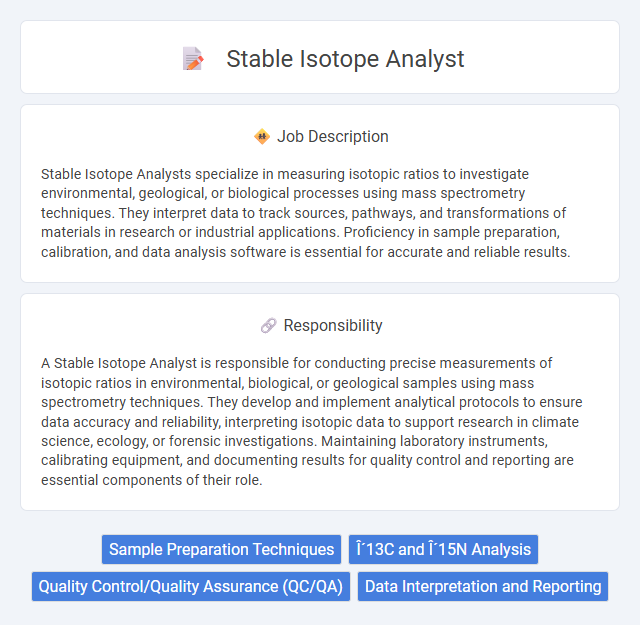
Stable Isotope Analysts specialize in measuring isotopic ratios to investigate environmental, geological, or biological processes using mass spectrometry techniques. They interpret data to track sources, pathways, and transformations of materials in research or industrial applications. Proficiency in sample preparation, calibration, and data analysis software is essential for accurate and reliable results.
Individuals with strong analytical skills and attention to detail will likely be well-suited for a Stable Isotope Analyst role, as the job demands precise measurement and data interpretation. Those who enjoy working in scientific research environments and have a background in chemistry or environmental science may find this position compatible with their interests and abilities. Candidates who prefer routine tasks without complex problem-solving might find the job challenging due to its technical and interpretive nature.
Qualification
A Stable Isotope Analyst requires a strong background in chemistry, geochemistry, or environmental science, typically holding at least a bachelor's degree, with many positions favoring a master's or PhD. Expertise in mass spectrometry techniques, including isotope ratio mass spectrometry (IRMS), and proficiency in data analysis software are essential for accurate interpretation of isotopic data. Strong analytical skills, attention to detail, and experience with sample preparation and laboratory protocols ensure reliable and precise results in research or applied settings.
Responsibility
A Stable Isotope Analyst is responsible for conducting precise measurements of isotopic ratios in environmental, biological, or geological samples using mass spectrometry techniques. They develop and implement analytical protocols to ensure data accuracy and reliability, interpreting isotopic data to support research in climate science, ecology, or forensic investigations. Maintaining laboratory instruments, calibrating equipment, and documenting results for quality control and reporting are essential components of their role.
Benefit
Stable Isotope Analyst roles likely offer significant benefits such as opportunities to work with cutting-edge analytical technologies that enhance precision in environmental and biochemical research. Employees may experience increased job security due to the specialized skill set required in fields like geochemistry, archaeology, and climate science. The position probably supports professional growth through collaboration with interdisciplinary teams and contributions to impactful scientific studies.
Challenge
The role of a Stable Isotope Analyst likely involves complex challenges related to precise measurement and interpretation of isotopic data in various environmental and geological samples. Analysts probably face difficulties in maintaining accuracy amidst potential contamination and instrument calibration issues. Navigating these challenges requires advanced technical skills and problem-solving capabilities to ensure reliable and meaningful results.
Career Advancement
A Stable Isotope Analyst career offers expansive growth through expertise in mass spectrometry, geochemistry, and environmental science, essential for roles in research, forensics, and environmental consulting. Mastery in data interpretation and instrument calibration enhances potential for leadership positions such as laboratory manager or senior research scientist. Continuous skill development in bioinformatics and isotope ratio analysis software drives advancement in academia and industry sectors.
Key Terms
Sample Preparation Techniques
Stable Isotope Analyst roles require expertise in advanced sample preparation techniques such as cryogenic trapping, micro-extraction, and acid digestion to ensure accurate isotopic measurements. Proficiency in contamination control and isotopic dilution methods enhances the reliability of isotope ratio mass spectrometry (IRMS) analyses. Mastery of these preparations directly impacts the precision of carbon, nitrogen, oxygen, and sulfur isotope data critical for environmental and geochemical investigations.
δ13C and δ15N Analysis
A Stable Isotope Analyst specializing in d13C and d15N analysis utilizes mass spectrometry techniques to measure isotopic ratios in biological and environmental samples, providing critical insights into food web dynamics, nutrient cycling, and ecological interactions. Proficiency in sample preparation, calibration standards, and data interpretation ensures accurate isotopic signatures that support research in paleoecology, forensics, and biogeochemistry. Expertise in quality control and statistical analysis enhances the reliability of d13C and d15N measurements for tracing carbon and nitrogen sources within complex ecosystems.
Quality Control/Quality Assurance (QC/QA)
Stable Isotope Analysts specializing in Quality Control and Quality Assurance (QC/QA) ensure the precision and accuracy of isotopic measurements by implementing rigorous validation protocols and calibration standards across all analytical instruments. They develop and maintain comprehensive QC documentation, conduct regular performance audits, and troubleshoot anomalies to guarantee data reliability for environmental, geological, or biochemical research. Proficiency in isotope ratio mass spectrometry (IRMS) techniques and adherence to ISO 17025 guidelines are critical for maintaining high-quality analytical outputs and regulatory compliance.
Data Interpretation and Reporting
Stable Isotope Analysts specialize in interpreting complex isotopic data to uncover environmental, geological, or biological patterns. They apply advanced statistical techniques and software tools to ensure accuracy and consistency in isotope ratio analysis. Detailed, clear reporting of results supports research conclusions, regulatory compliance, and decision-making processes in various scientific domains.
 kuljobs.com
kuljobs.com